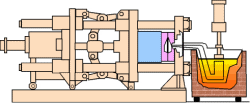Although die casting can still be created by hand, mass producing pieces for global consumption would, of course, entail the use of higher end and more efficient machines. The most prominent of die casting tools are the machines that produce several thousand pieces on a daily basis. These are the hot and cold chamber machines. Both machines serve the same functions, and one cannot really say that one is better than the other. The difference lies in the fine print. For this article, we will discuss the process of hot chamber machines.
Hot chamber machines in zinc die casting are best suited for heavier metals, or metals that have lower melting points, or alloy that have the same properties. Molten lead is one of the best examples of such metal; as well as copper, magnesium, and zinc based alloys. These do not erode the actual components of the hot chamber machines, which makes production not only go faster, but safer as well.
The process for using these machines begins by melting the metal or alloy that is to be used in production. This is done in a huge vat that runs called the metal bath. This metal bath is attached to a gooseneck or a cylindrical metal feed system, which is eventually pumped with the molten material during processing. In turn, the gooseneck redirects some of the material into the casting die, and the material is allowed to cool within the die cavity. Once the material is solid enough, the casting die opens and automatically ejects the pieces.


